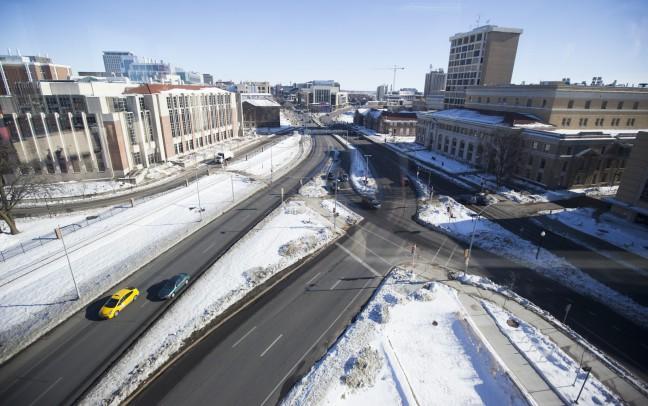Gov. Scott Walker plans to eliminate $8.1 million in funds to the Wisconsin Bioenergy Initiative implemented by the Wisconsin Energy Institute, one of multiple cuts to environmental projects at the University of Wisconsin System.
The WEI focuses on collaborative research that stretches over several different sectors of energy, according to Mary Blanchard, the associate director of WEI. She said the institute also works toward educating future energy leaders and engaging the public in energy issues.
Blanchard said the money WEI receives from the state for the bioenergy program forms a significant percentage of its budget, which goes into providing for faculty and for research programs. WEI also receives some funding from the Great Lakes Bioenergy Research Center, but this amount is too small to sustain the institute, she said.
“Because of the funding cuts, we will have to reassess what we could still support here in terms of staff resources,” Blanchard said. “It would really scale back our ability to maintain the level of activity we currently have.”
In an email to The Badger Herald, Walker spokesperson Laurel Patrick said the funding cut is part of a proposal that aims to provide an annual block grant to the UW System that would provide long-term financial stability for the system. She said the proposal would give UW the flexibility to fund their priorities.
The funds eliminated from the bioenergy program are not included in the $300 million in cuts that Walker has proposed for the UW System.
WEI is not the only environmental initiative in the UW System that will see reductions under Walker’s budget. Karl Martin, director of the Community, Natural Resource and Economic Development Program at UW Extension, said the cuts will greatly affect his department. State funding for the Solid and Hazardous Waste Education Center, which provides technical assistance and research-based education for recycling, pollution prevention and waste reduction, is eliminated from Walker’s budget.
“We would be looking for other sources of funding, but the reality is these cuts are so drastic that we would likely have to lay people off,” Karl said. “We would not be doing that work anymore.”
Blanchard said WEI is working with UW professors to increase the amount of energy research conducted on campus. This will allow WEI to receive “indirects,” which is a small amount of money given to the department or entity that earns a grant for the research being conducted. She said this has the potential to increase funds available to WEI over time.
The GLBRC, although independently funded by the U.S. Department of Energy, has strong ties to WEI and works closely with it. John Greenler, Education and Outreach Director of GLBRC, said the center is involved in several bioenergy projects and many other cross-disciplinary projects funded by WEI on the UW campus.
“We [GLBRC] highly value the opportunity to interact with researchers in a broad spectrum of energy and bioenergy projects,” Greenler said. “The WEI does a stellar job of providing a nexus for all of that interaction and collaboration in energy here on the UW campus and statewide, as well.”
Nina Kravinsky contributed to this story.


